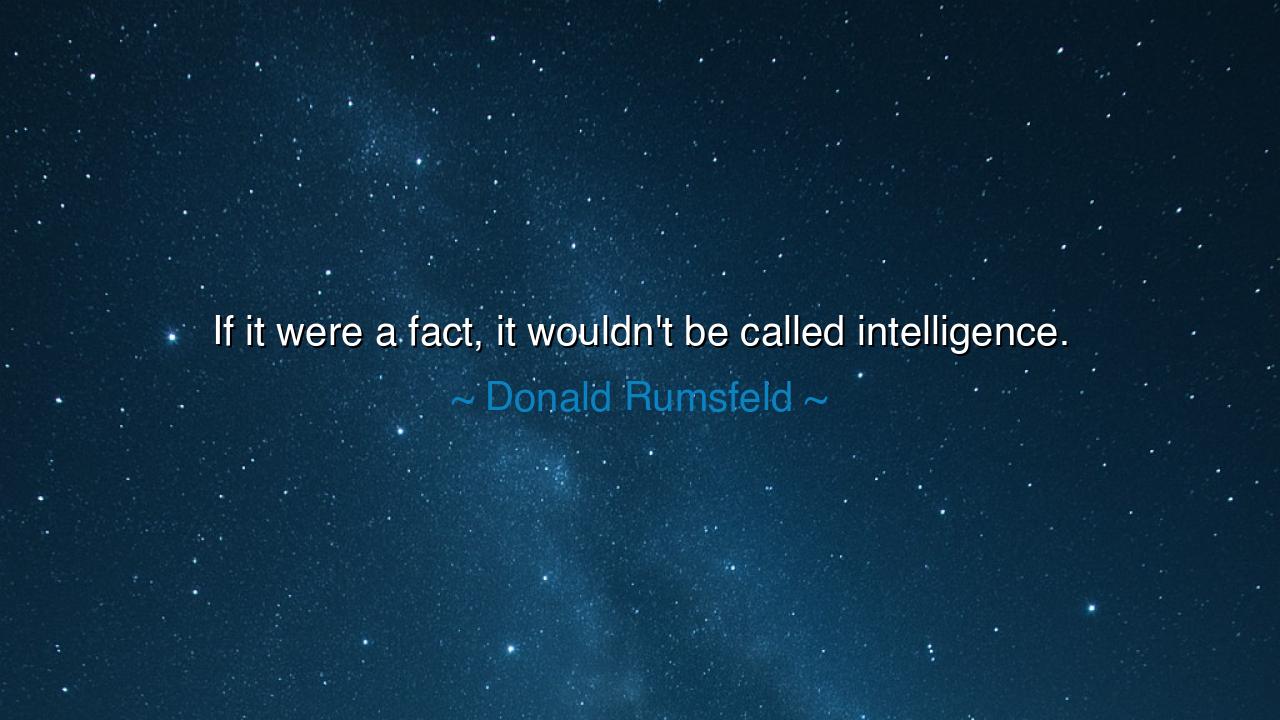
If it were a fact, it wouldn't be called intelligence.






The words of Donald Rumsfeld — “If it were a fact, it wouldn’t be called intelligence.” — echo with the dry wisdom of a soldier who has walked the fog of war and learned how fragile truth becomes when cloaked in secrecy. Beneath their sharpness lies a profound reflection on the nature of knowledge, on the thin line between what we know and what we believe we know. In this statement, Rumsfeld reminds us that intelligence — in war, politics, or life itself — is not certainty, but perception, interpretation, and often, error. It is the light we follow through the mist, never knowing whether it leads to victory or into the abyss.
In the world of spies and statesmen, facts are gold, but intelligence is shadow — shifting, uncertain, always partial. A fact is solid, proven, immovable. It is the mountain seen in daylight. But intelligence is the silhouette glimpsed at dawn, the rumor that might be truth or might be deceit. To act on intelligence is to wager on possibility; it is to navigate by moonlight, trusting that your judgment can pierce illusion. Rumsfeld, who served as U.S. Secretary of Defense during times of great global turmoil, knew well that nations rise and fall not only by what they know, but by what they think they know. His words expose the perilous foundation upon which the decisions of empires are often built.
History is filled with the consequences of this truth. Consider the Cuban Missile Crisis of 1962. The United States possessed intelligence that the Soviet Union was placing nuclear weapons in Cuba. Yet at that time, intelligence was not fact — it was an interpretation of aerial photographs, a hypothesis shaped by fear and urgency. One wrong move, one false conclusion, and the world might have burned. It was the careful distinction between what was certain and what was only probable that saved humanity from destruction. Rumsfeld’s words could have been whispered in that tense moment: intelligence guides, but facts command.
To understand this quote more deeply, one must see beyond the world of espionage. Life itself is a field of uncertain intelligence. We make decisions based not on full knowledge, but on fragments of truth, on instinct, on perception. The merchant invests in faith of fortune, the lover trusts in promises, the general moves his army based on reports that may deceive him. Every act of courage, therefore, is an act of risk. The wise accept that certainty is rare, and they do not demand perfect clarity before they act — for to wait for certainty is to be paralyzed. The art of living, like the art of war, lies in acting wisely amid uncertainty.
Yet there is another layer to Rumsfeld’s wisdom: a warning. Intelligence, when mistaken for fact, becomes arrogance. When men or nations believe their perceptions to be truth, they cease to question, they cease to doubt — and in that moment, they court disaster. The invasion of Iraq in 2003, which Rumsfeld himself oversaw, stands as a haunting testament to this. Intelligence reports spoke of weapons of mass destruction — yet none were found. The lesson is as old as the ancients: the danger of mistaking shadow for stone, and assumption for truth. Thus, his quote, though simple, carries the weight of tragedy and experience. It is not boastful — it is rueful, like a general speaking to the young, saying, “Know what you do not know.”
In the age of information, Rumsfeld’s insight grows ever more vital. We are flooded with data, yet starved for truth. Every headline, every whisper of news, every algorithm of influence pretends to be fact, yet most are intelligence — fragments, biases, interpretations, half-lit mirrors of reality. The wise among us must learn to ask: Is this proven, or merely claimed? Is this knowledge, or the illusion of it? For discernment is the new weapon of survival.
And so, the lesson of this quote is both humbling and empowering: Never confuse intelligence with truth. Seek evidence, but respect uncertainty. Act boldly when needed, but question always. The sage moves through life with open eyes, neither blind in belief nor frozen by doubt. Let your judgment be cautious, your knowledge humble, and your decisions guided by both wisdom and skepticism. For in the end, the line between success and ruin is drawn not by how much one knows — but by how well one knows what one does not know.






AAdministratorAdministrator
Welcome, honored guests. Please leave a comment, we will respond soon